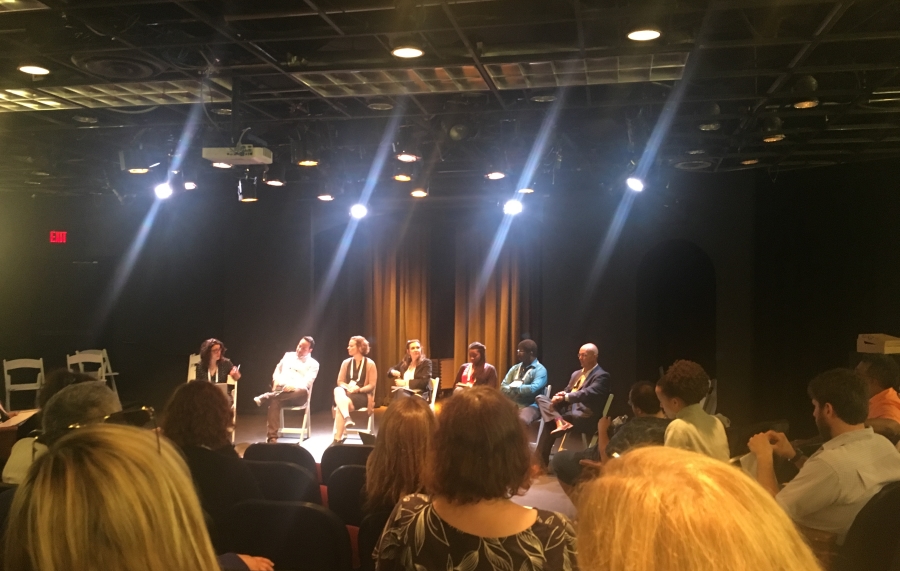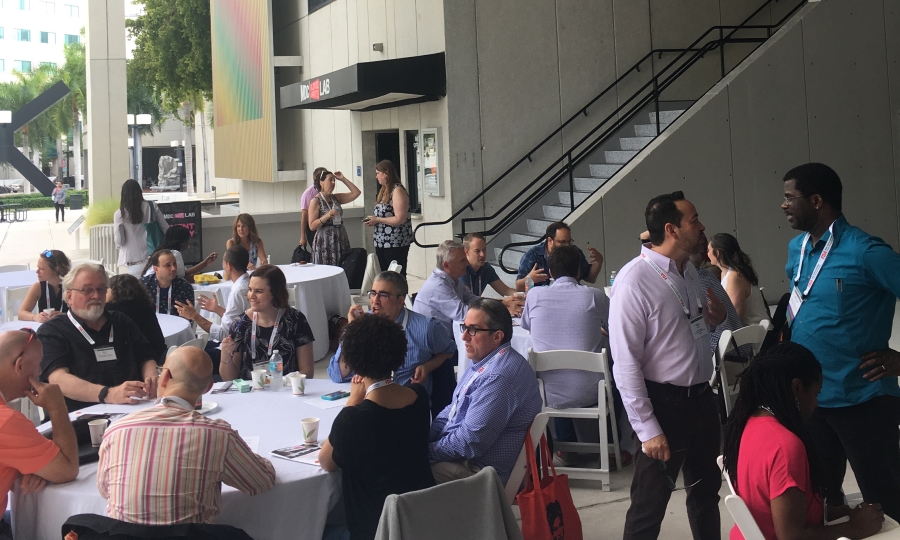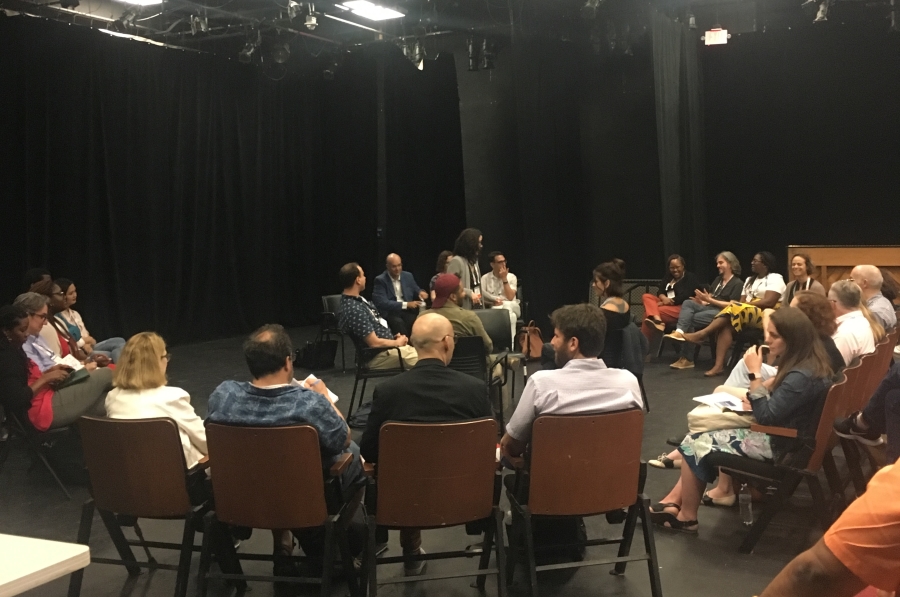Allison Therese Considine. I presented my full name to a circle of strangers and watched as they all looked back at me. They shifted their weight into their left hip, threaded their fingers together, as mine were, and said with a matching cadence in unison: “Allison Therese Considine.” I also observed as a room full of students, educators, and administrators all experienced the strange and emotional sensation of hearing their own full given names take up space in the room.
This “call and response” introduction opened the Higher Education Pre-Conference program and kicked off the 2019 TCG National Conference in Miami. Titled “Empowering the Future of the Field: Changing Landscapes in Higher Education,” the event brought together nearly 100 people from various universities and institutions across the country to share best practices in crafting curriculum, approaching training, raising funds, organizing projects, and preparing students for the field.
The one-day program was organized by Derek Goldman, co-director of the Laboratory for Global Performance and Politics at Georgetown University in Washington, D.C., and Lisa Portes, head of directing at the Theatre School at DePaul University in Chicago.
“This feels historic,” said Goldman to the rows of attendees at the MDC Live Arts Lab. And it was: This gathering of people in the black box, retreating from the sweltering Miami heat, marked the first such convening dedicated to higher education at a TCG conference. Just a mile north, a cohort of education staffers at theatres gathered at YoungArts for another milestone meeting. (Video of that pre-conference can be found here.)
“What a unique and powerful position our institutions occupy,” said Portes. “We live at the mouth of the system of the field. The decisions around who we train, how we train, what we’re addressing, and what we’re not addressing affect the entire field. We can and must do more when it comes to training our students…they are ahead of us in understanding what the world can be.”
Portes asked attendees to gather on the stage and map themselves into groups according to discipline—administrator, director, teacher, performer, etc. The result was an amorphous group of starfish-like stretch poses, as multi-hyphenates tried to reach a limb into various cohorts. The busy tableaux represented a running theme of the pre-conference: the need to converge parallel lanes, close the gap between training institutions and the field, and to encourage holistic, multidisciplinary training.
The remarkable feeling of stating our full names, with the family histories they contain and signify, tied into the many conversations about individualizing training and designing the experience for the needs of each student.

To the Revolution!
The pre-conference program aimed to find solutions to issues that are increasingly affecting theatre programs: a rising pool of applicants, mounting tuition costs, and a lack of diversity in the classroom and the artistic programming. “It’s all about how we forge the revolution,” said Portes.
Clearly, a more diverse, equitable, and knowledgeable group of students would inevitably feed into a more diverse and equitable field. “Higher education fuels a lot of the problems within the industry,” shared Monica White Ndounou, associate professor of theatre at Dartmouth College. “Are we training cogs in the machine or do we want them to be changemakers?”
Ndounou, along with five other educators, took to the stage to share case studies from their campuses of how they’re creating educational experiences beyond scene work, taking learning outside of the rehearsal room, and connecting the universities to the wider community through partnerships.
Ndounou talked about the process of getting institutional support to mount the 2018 International Black Theatre Summit at Dartmouth College to commemorate August Wilson’s historic “The Ground on Which I Stand” speech.
Marissa Chibas, who heads the Duende initiative at CalArts, spoke about the school’s partnership with local children’s hospitals, an exchange program with students in Oaxaca, and a residency program in Cuba. The philosophy that she shares with her students: “Be like water, go wherever you are needed.”
Edgar M. García, artistic director of Miami’s Teatro Prometeo, pointed to a project with playwright Lisa Loomer to create Casa Ajena, a bilingual version of her play Living Out. The show attracted new audiences from various Miami neighborhoods.
Stefanie Sertich spoke about the theatre program at LaGuardia Community College in Queens, New York, and the partnerships that help keep the two-person led theatre program afloat. The key to finding support with other departments on campus and theatre companies in the city, she shared, is to pair service learning and experiential learning. The school’s students have low remediation rates and come from low-income backgrounds. To optimize the time of students, many of whom attend college part-time, volunteer programs were created with local organizations. Students’ experiences with homeless shelters, prisons, etc., in turn provided source material for devised plays. Sertich reported that students in the program have a higher graduation rate than the school’s average of 27 percent.
“It isn’t about learning in the classroom, it’s about what they’re learning on the streets,” said Sertich. “And then it is their own experiences—we found that a few of the students had been homeless. I’m not sure we would’ve learned that without going through this.”
In the afternoon, the attendees ventured a few blocks east to the New World School of the Arts, a high school and college, for group discussions about the economics of higher education and equity, diversity, and inclusion.
As someone saddled with student loans myself, I went to a session on the “Economics of Higher Education” with hopes of hearing solutions that would offer future students an opportunity to leave school without the albatross that’s around my neck. I learned that there are 2,300 undergraduate theatre degree programs churning out debt-ridden theatre artists. “How do we match the program with the price tag?” one voice called out. The 35-minute session didn’t provide enough time to tackle that quandary.
The discussion of unpaid internships was a hot topic. A representative from Carnegie Mellon University shared that the institution took a stand, communicating to local theatre companies that their students were not available for unpaid opportunities. Stipends and compensation were forthcoming. Others offered practices of mandating internships as part of class credit, and monitoring students’ off-campus experiences. The issue of exploitative internships ties into the subject of low compensation in the field, and creates a barrier to entrance for recent graduates seeking employment.
A representative from Emerson College shared the theatre program’s way of meeting students’ need to work part-time during school: Students pool money and a winner receives $250 in grocery gift cards and cash each week. So far the lottery system has disbursed more than $125,000 and afforded students the opportunity to partake in more shows instead of punching in for shifts. The school is also working to have more flexible, shorter rehearsal periods to accommodate students’ schedules.

Design Our Way Out?
This afternoon session, co-led by Kelvin Dinkins Jr., the assistant dean and lecturer in theatre management for Yale School of Drama, and Nicole Brewer, adjunct professor at Howard University, pointed to ways EDI work can be folded into classroom practices.
“How do we design our way out?” posed Dinkins Jr. For her part, Brewer recommended approaching the work from an anti-racist ethos and getting rid of the theory of gradualism. The time to dig into the work is now, not after longtime faculty retire. And beyond merely diversfying artistic programming, EDI should be at the forefront of the recruitment and auditioning process for schools. It should be built into the curriculum. It isn’t enough to produce an August Wilson play, said Brewer. “In your class, how are you bringing these voices into the room and holding them up as excellent?” she queried. “And what makes it excellent, not ‘other’?”
Attendees shared ways that their institutions are further addressing the needs of their students, and the ways that they can work to erase racist ideas and policies. For Dinkins Jr., the key is to build trust among students, faculty, and staff, and thereby create a shared language. “We got so far down this road of equity, diversity, and inclusion, challenging it and naming it, that we forgot grace,” said Dinkins Jr. “We forgot how to treat each other as members of a community. Now everyone is afraid to say the wrong thing.”
A BFA student at DePaul shared her own teachers’ approach of calling class discussions “civil discussions” and encouraging students to share when comments affect them and to call in other students. At Yale School of Drama, the school makes space to process current events as a sort of town hall, a monthly event that began after the Pulse shooting in 2016.
Come On Down
Attendees circled up for a final discussion, and the mic was passed to the students in attendance. A number of current students and recent graduates from across the country, in addition to a few ASPIRE Fellows from the Kennedy Center American College Theatre Festival, were in attendance for the TCG National Conference.
Portes arranged the theatre to have two circles, borrowing the setup from the Latinx Theatre Commons. The inner circle was for the students, and attendees who wished to speak could “tap someone out” for the chance to speak.
The day focused on a need for change, and the students presented a pathway forward. Students shared their takeaways from the pre-conference sessions and presented the room with their hopes and dreams for the field.
“I am ready to fight and to continue to do the work we’re doing with the curriculum,” said Sierra Priest, an MFA student at CalArts.
Said Isabella Mary O’Keefe, an ASPIRE Fellow and student at the College of the Sequoias in Visalia, Calif., “Even though in theatre we’re known for breaking down barriers, often students are put into barriers—actors are separated from students with technical experience. We have ideas, but the administrators don’t seem to listen.”
The students also shared a wish list of classes they’d like to take: a dance therapy class to connect people through movement, a free-writing course to encourage expression, martial arts to learn energy transference and breath work, and a course on how to find a self-care routine. “Sign me up for this school!” said Portes with a laugh.
Indeed the need for self-care was a throughline throughout the TCG National Conference as a whole.
“For those of you who’ve been in the industry and doing social activism, what are your everyday coping mechanisms to create longevity in a field where you’re constantly giving yourself?” ASPIRE Fellow and recent North Carolina A&T State University graduate Shanel Lashay Smith asked of the audience.
Answered Brewer, “Find something, a practice that is for you, that restores you and fills your gas tank back up.”
The student-led final session ended the day on a hopeful, forward-looking note. Marshall Jones, artistic director of Crossroads Theatre Company in New Brunswick, N.J., came down to the circle to encourage the students.“The skills that you learn putting shows together are so valuable,” he said. “You learn empathy. You are understanding how a character lives, thinks, walks—that is a skill that the business kids don’t get. You learn teamwork…We as a field recognize how valuable this is because we’re part of it, but know that you can shift and plant these transferable skills.”
For his part Brian Herrera, associate professor of theatre at Princeton University, offered up a bit of advice that began with a question. “What is the superpower that you want to leverage and use to change the world?” he asked. “Figure out the platform that will give you the structure and the resources to do you in the full-throttle way.”
Looking ahead to the week of programming at the TCG conference, Derek Jackson, a BFA student at CalArts, said, “While I’m here I’m trying to be a sponge and absorb. I’m low-key geeking out seeing everyone’s name tags.” Dinkins Jr. responded: “Learn how to tap people for resources—it’s the most important skill.”
It was Patrice Bailey, the dean of students at the New World School of the Arts, who offered the perfect closing, effusing, “I can hear the revolution in your voices!”


